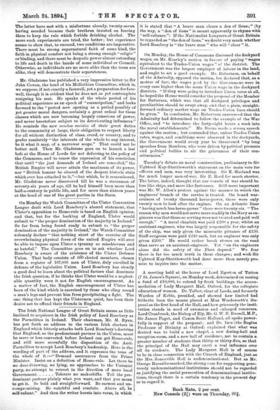Mr. Gladstone has published a very impressive letter to Sir
John Cowan, the head of his Midlothian Committee, which is, we suppose, if not exactly a farewell, yet a preparation for fare- well, though it is evident that he does not as yet contemplate resigning his seat. He speaks of the whole period of his -political experience as an epoch of "emancipation," and looks forward to the "period now opening as a period possibly of _yet greater moral dangers, certainly a great ordeal for those classes which are now becoming largely conscious of power, and never heretofore subject to its deteriorating influences." He reminds the new couches sociales of their great duties to the community at large, their obligation to respect liberty for all without distinction of class, creed, or country, and to prefer resolutely " the interests of the whole to any interest, be it what it may, of a narrower scope." That could not be better said. Then Mr. Gladstone goes on to launch a last bolt at the House of Lords for not deferring to the policy of the Commons, and to renew the expression of his conviction that until "the just demands of Ireland are conceded," the British Empire will never attain the maximum of its power, nor "British honour be cleared of the deepest historic stain which ever has attached to it,"—but which, be it remembered, Mr. Gladstone never discovered till he was a statesman of 'seventy-six years of age, till he had himself been more than half-a•century in public life, and for more than sixteen years at the head of one of the great parties in the State.


































 Previous page
Previous page